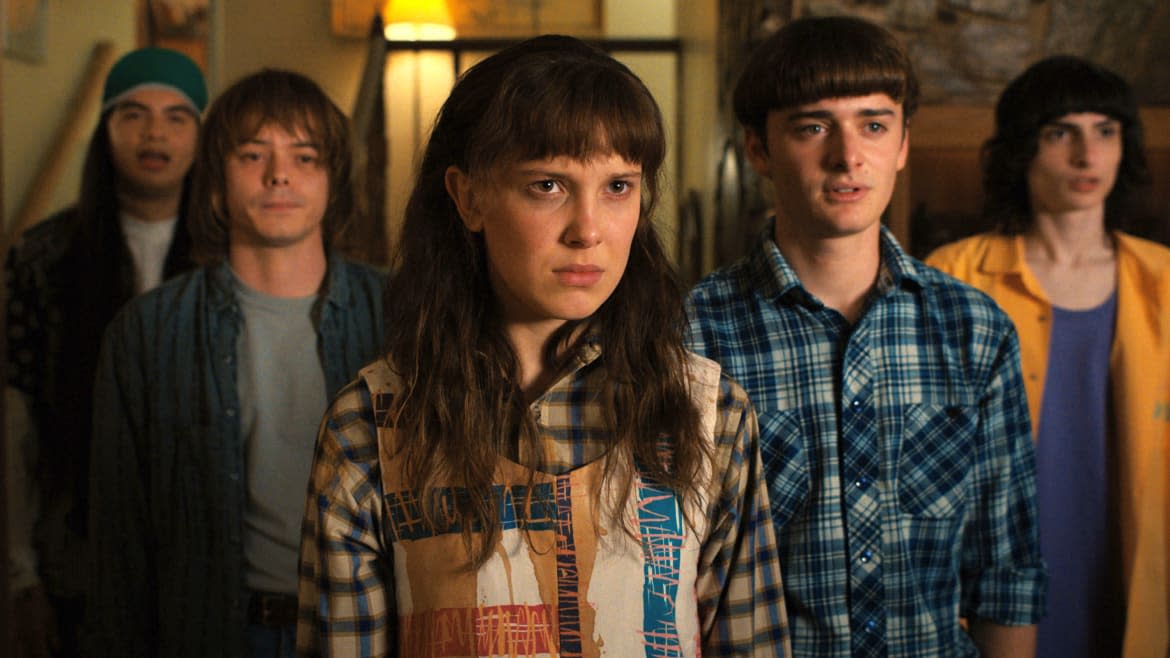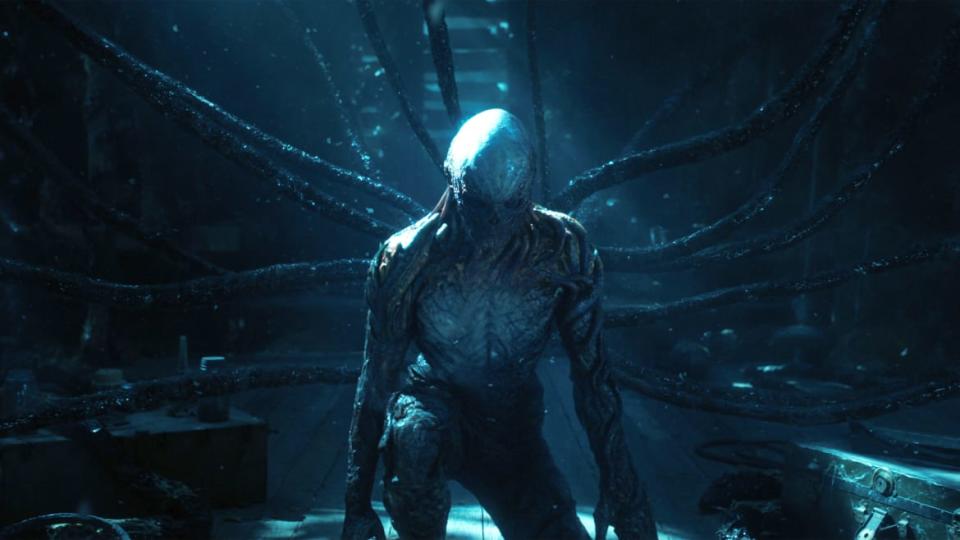‘Stranger Things’ Season 4 Opens With a Massacre of Children

- Oops!Something went wrong.Please try again later.
This is a preview of our pop culture newsletter The Daily Beast’s Obsessed, written by senior entertainment reporter Kevin Fallon. To receive the full newsletter in your inbox each week, sign up for it here.
About six minutes into the new season of Stranger Things, you start to hear screams. Blood-curdling, terrified screams—of children. Soon after, the camera tracks one shell-shocked character as he stumbles the halls, distraught as he trains his eyes on countless lifeless, maimed young bodies. Stranger Things Season 4 opens with a massacre of children.
Obviously nobody involved in the making of the series could have imagined the timing of this season premiere, with that violent opening scene piercing through a dense fog of heartache, anger, and fear over the tragic news this week. A scene that was meant to be disturbing now evolves from difficult to nearly impossible to watch.
There will probably be aggrieved cries wondering how Netflix could have let a scene like this stay in the episode given how raw and fresh the trauma is over what happened in Texas. There will also be defenders saying, how could they have known?
But there is, perhaps, reason to be less than generous over this.
How could they have known? Well, mass shootings—massacres—have become so constant that the instances of them have outnumbered the days there have been in 2022. A scene like this was always going to be triggering, though perhaps not to the extreme that it is at this moment. That is the point of this kind of scene, to conflate trauma and titillation. To exploit the horrors that have become the reality of the world right now for entertainment.
In fact, Netflix was so certain that the sequence would be met with awe and appreciation for how thrillingly it captures something so dark that it even released it—all eight minutes—ahead of Friday’s streaming premiere of the new season, presuming that it would drum up excitement, or reassure fans that this batch of episodes wouldn’t disappoint. The massacre of children as proof of quality. (The video has since been deleted, and Netflix will run a content warning ahead of the episode.)
Earlier this week, CBS announced that it would be pulling the season finale of its series FBI, as the episode involved the team trying to prevent a school shooting. Again, there was apparently so much dramatic potential and possibility of attracting viewers in a storyline involving a school shooting that a CBS procedural series had planned to make a finale event out of it.
Abbott Elementary creator and star Quinta Brunson garnered attention when she tweeted about the number of requests she receives to write a school shooting episode of her series, a charming sitcom about teachers who bond while working to do the best for their students. One message she screenshot said, “This is just an idea. For the eventual series finale, a school shooting episode to highlight the numerous ones in this nation. Formulate an angle that would get our government to understand why laws need to pass.”
Exhibit A: one of many. pic.twitter.com/mxcKWl3c17
— quinta brunson (@quintabrunson) May 25, 2022
There is obviously great power in television, especially when it, with care and nuance, reflects back our reality, ugly as it may be. But there’s something unforgivably backwards about the presumption of school shootings—of these massacres—as valid entertainment, a kind that we don’t just resign ourselves to or expect because it’s become so common, but even crave or, as that message to Brunson suggests, feel entitled to.
FBI wasn’t the first TV series with a plot that centered around a school shooting and Stranger Things isn’t the first show to find its violence ill-timed to the news and cultural mood. There have been episodes of everything from Cold Case and CSI to 7th Heaven and, for the love of God, Glee.
It’s an impossible thing to have a strict opinion on. It would seem ridiculous to say that TV series should steer clear of an event that is, horrifically, something that has started to affect and connect most of the country. But it does seem wholly inappropriate, not to mention crass, to translate it into entertainment.
What sticks with me about the sequence in Stranger Things is that it was sent out as a promotional tool. Yes, it’s an effective scene, and it pays off in the larger plot of the season. But thinking about it in relation to what this show once was—a nostalgic, invigorating mystery built around the tenets of ’80s cinema—suggests what might be the biggest problem with the new season.
It’s grandiose and it’s terrifying. It’s breezy and watchable in spite of the fact that the majority of the new episodes hover around 70-80 minutes each. But it’s also lost the spark that made it special on its way to becoming something so ambitious and so dark.
This show has become such a behemoth that it’s easy to forget that, when it premiered, it was considered a scrappy underdog. That scrappiness was reflected in the way the show unfolded.
Ellen DeGeneres Dances Off Into Oblivion With Series Finale and a Complicated Legacy
Sure, by nature of the subject matter, there were special effects and action set pieces; monsters, secret mirror worlds, and children with telekinetic powers necessitate that sort of thing. But there’s a grandness and a bloatedness to Season 4 of the series, which is so aggressive in its insistence on dazzling with CGI that it numbs all of the fun and, often, the heart that used to be there. Those elements had to be played up and embraced because of the fact that the series had a fraction of the budget it is parading across the hours (and hours) of this new season. No one likes a show off.
Except, I guess, they do. Or at least they don’t mind one. The new season is still fun to watch, in the way that one can find amusement in a slog.
The easy description, without giving away spoilers, is that Eleven (Millie Bobby Brown) has moved to California with Joyce (Winona Ryder) and her two kids Jonathan (Charlie Heaton) and Will (Noah Schnapp) following the presumed death of her father, Jim Hopper (David Harbour). Emphasis on presumed.
Back in Hawkins, a pattern of grotesque deaths is rattling the poor, ever-suffering town. The Scooby Gang (basically, everyone else in the cast) suspects something supernatural is involved and that they are uniquely qualified to track down and defeat it. Across the seven episodes of the first half of Season 4 (the final two episodes premiere July 1), they, well, attempt to do just that.

A demogorgon in Stranger Things Season 4.
It takes forever to get to the meat of the mystery here and, over these endless running times, there are some grave misjudgments over what side plots and character larks audiences might find amusing to follow. It’s unfortunate because the mythology of Stranger Things is finally coming to focus in gratifying ways. It’s just exhausting to spin through the same character trauma cycles on the way to discovering them.
This piece was originally meant to be a proper review of the new season, not necessarily such an extended tangent about the ethics of that opening scene. But the fact of the matter is that this new season of Stranger Things is probably review-proof.
I could send a text message directly to each of your phones warning you not to watch this show because they replaced Millie Bobby Brown with Roseanne Barr and made the decision to have all the kid actors speak to each other in Elvish while the Demogorgons are now merely extras running around with hats on their heads that say, “I’m a Demogorgon,” and you’d all still watch. Every single hour. Which is precisely why Netflix has OK’d so many hours.
And I couldn’t shake the feeling that, while, again, the timing is unexpected, there was something that didn’t sit right about that violent sequence. So watch Stranger Things 4 or don’t. (You’re all going to watch it.) But maybe, at least, that’s some food for thought.
Get the Daily Beast's biggest scoops and scandals delivered right to your inbox. Sign up now.
Stay informed and gain unlimited access to the Daily Beast's unmatched reporting. Subscribe now.

